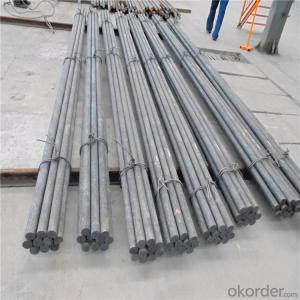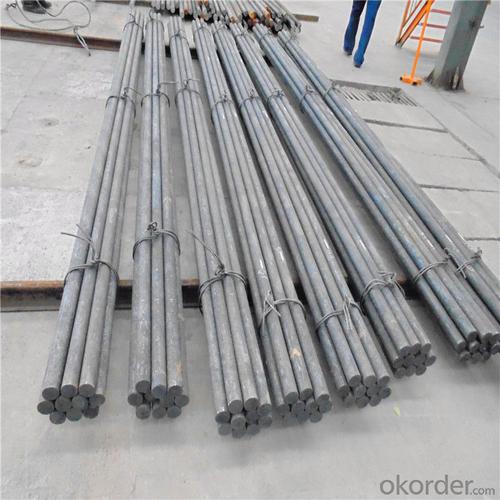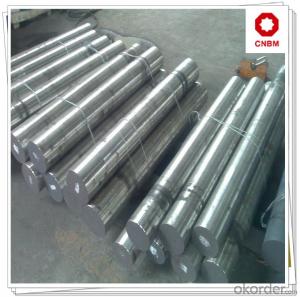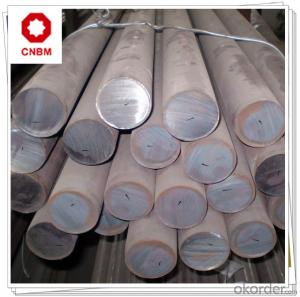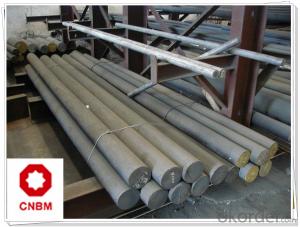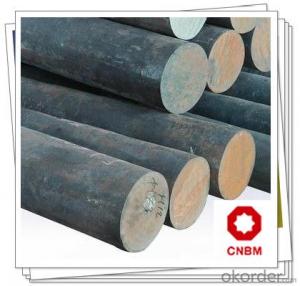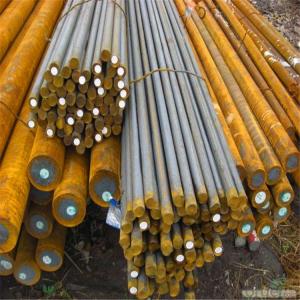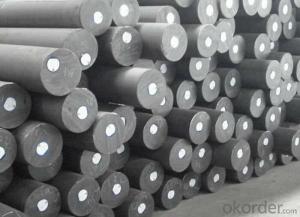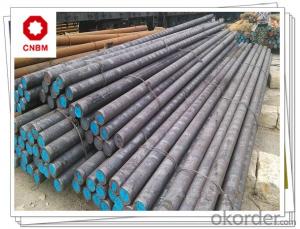Quality Hot Rolled Carbon Steel Round Bar S20C
- Loading Port:
- Tianjin
- Payment Terms:
- TT OR LC
- Min Order Qty:
- 100 m.t.
- Supply Capability:
- 500000 m.t./month
OKorder Service Pledge
OKorder Financial Service
You Might Also Like
Specification
Quality Hot Rolled Carbon Steel Round Bar S20C
Product Description of Quality Hot Rolled Carbon Steel Round Bar S20C
1. Steel grade: SAE1020, 20#, C22, S20C
2. Length: 6M-12M
3. Diameter: 16mm-300mm
4. Product range: round bar, flat bar, square bar
5. Technique: Hot rolled, forged, cold drawn
Specification of Quality Hot Rolled Carbon Steel Round Bar S20C
Material | S20C | Round bar | Dia(mm) | 16-300mm |
Process | EAF + LF + VD + Forged + Heat Treatment (optional) | Length (mm) | Max 12m | |
Heat treatment | Normalized / Annealed / Quenched / tempered | Flat bar | Thickness(mm) | 8-500mm |
Delivery condition | Hot forged +Rough machined (black surface after Q/T)+ Turned (optional) | Width(mm) | 70-200mm | |
Test | Ultrasonic test according to SEP 1921-84 D/d | Length (mm) | Max 12m |
Chemical Composition of Quality Hot Rolled Carbon Steel Round Bar S20C
C | Si | Mn | Cr | Ni | Cu |
0.17~0.23 | 0.17~0.37 | 0.35~0.65 | ≤0.25 | ≤0.30 | ≤0.25 |
Photo Show of Quality Hot Rolled Carbon Steel Round Bar S20C
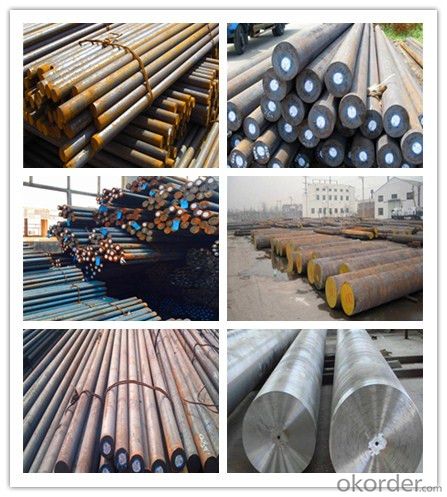
Packing and Delivery:
Packing in bundle package, or as customer's requirements.
Delivery Detail: 45 days after receiving the deposit.
Usage and Applications of Quality Hot Rolled Carbon Steel Round Bar S20C
1. Steel round bar is used in a large number of architectural and engineering structures. Or it can be used in construction of plants for the production of steel house frames, high-voltage transmission towers, bridges, vehicles, boilers, containers, ships, etc.
2. And we can use this kind of product on the performance of the mechanical parts if the demand is not very high.
3. Some special material steel round bar can be used for main shaft of steamer, hummer shank, with big section and supper force.
Company Information
CNBM International Corporation is the most important trading platform of CNBM group.
Whith its advantages, CNBM International are mainly concentrate on Cement, Glass, Iron and Steel, Ceramics industries and devotes herself for supplying high qulity series of refractories as well as technical consultancies and logistics solutions.


F A Q
1, Your advantages?
professional products inquiry, products knowledge train (for agents), smooth goods delivery, excellent customer solution proposale
2, Test & Certificate?
SGS test is available, customer inspection before shipping is welcome, third party inspection is no problem
3, Factory or Trading Company?
CNBM is a trading company but we have so many protocol factories and CNBM works as a trading department of these factories. Also CNBM is the holding company of many factories.
4, Payment Terms?
30% TT as deposit and 70% before delivery.
Irrevocable L/C at sight.
5, Trading Terms?
EXW, FOB, CIF, FFR, CNF
6, After-sale Service?
CNBM provides the services and support you need for every step of our cooperation. We're the business partner you can trust.
For any problem, please kindly contact us at any your convenient time.
We'll reply you in our first priority within 24 hours.
- Q: What is the density of a steel round bar?
- The density of a steel round bar can vary depending on the specific type and composition of the steel, but on average, the density of steel is about 7.85 grams per cubic centimeter (g/cm³) or 7850 kilograms per cubic meter (kg/m³). This means that for a given volume of steel round bar, the weight or mass of the bar can be calculated by multiplying its volume by its density.
- Q: Can steel round bars be used for making fasteners?
- Yes, steel round bars can be used for making fasteners. Steel round bars are commonly used in the manufacturing of fasteners such as bolts, screws, and rivets. The strength and durability of steel make it an ideal material for fasteners, as it can withstand high levels of stress and provide a secure connection. Additionally, steel round bars can be easily machined and threaded to create the desired shape and size needed for fasteners. Overall, steel round bars are a reliable and commonly used material in the production of fasteners.
- Q: How do steel round bars compare to titanium round bars?
- Steel round bars and titanium round bars have different properties and characteristics that make them suitable for different applications. Here is a comparison between the two: 1. Strength: Titanium round bars have a higher strength-to-weight ratio than steel round bars. This means that titanium can withstand higher loads and stresses while being lighter in weight compared to steel. However, steel round bars are generally stronger and more rigid than titanium, making them suitable for heavy-duty applications that require high strength. 2. Corrosion Resistance: Titanium round bars are highly resistant to corrosion, even in harsh environments such as saltwater. Steel, on the other hand, is susceptible to corrosion and requires additional protective measures (such as coatings or galvanization) to prevent rusting. Therefore, titanium round bars are preferred in applications where corrosion resistance is essential. 3. Density: Titanium round bars have a lower density compared to steel round bars. This low density makes titanium ideal for applications where weight reduction is crucial, such as aerospace and automotive industries. Steel round bars, with their higher density, are typically used in applications where weight is less of a concern. 4. Temperature Resistance: Titanium round bars have excellent heat resistance, retaining their mechanical properties at high temperatures. Steel round bars, however, can lose their strength and become brittle when exposed to high temperatures. Therefore, titanium round bars are suitable for applications that require elevated temperature resistance. 5. Cost: Steel round bars are generally more affordable than titanium round bars. Titanium is an expensive metal due to its scarcity and complex extraction process. The cost difference between the two materials can be significant, making steel round bars more favorable for budget-conscious projects. In conclusion, the choice between steel round bars and titanium round bars depends on the specific requirements of the application. Steel is preferred for its superior strength and affordability, while titanium offers advantages such as high strength-to-weight ratio, corrosion resistance, temperature resistance, and lower density.
- Q: What's the difference between round steel and other steel bars?
- Different appearance, round steel appearance garden, no grain without rib, other steel surface has carved or ribbed. This causes the round bar and concrete bonding force is small, and other steel and concrete bonding force
- Q: Can steel round bars be used for hydraulic applications?
- Indeed, hydraulic applications do permit the use of steel round bars. Renowned for its robustness and endurance, steel proves a fitting substance for hydraulic systems demanding intense pressure and substantial burdens. Steel round bars facilitate the production of diverse hydraulic constituents, including cylinders, pistons, shafts, and valves. Moreover, steel's sturdiness and resistance to corrosion render it an unwavering option for hydraulic applications wherein the fluid may harbor impurities or undergo elevated temperatures. Nonetheless, it remains crucial to ponder over the specific prerequisites of the hydraulic application and meticulously choose the grade and type of steel round bars to ensure supreme performance and longevity.
- Q: What is the difference between a rough turned and a precision ground steel round bar?
- A rough turned steel round bar is a raw material that has undergone minimal machining, leaving a slightly rough surface finish. It is typically used for applications where a high level of precision is not required, such as structural components. On the other hand, a precision ground steel round bar is a finished product that has undergone precise machining to achieve a smooth and accurate surface finish. This process ensures tight dimensional tolerances and a consistent diameter throughout the length of the bar. Precision ground bars are commonly used in applications that require close dimensional control and a high level of accuracy, such as in machinery and tooling.
- Q: What is the difference between a cold-drawn and a polished steel round bar?
- A cold-drawn steel round bar is typically produced by pulling a hot-rolled bar through a die, resulting in a smoother and more precise diameter. On the other hand, a polished steel round bar undergoes an additional process of grinding or buffing to achieve a smooth and shiny surface finish. While both bars offer improved surface quality, the cold-drawn bar primarily focuses on dimensional accuracy, while the polished bar enhances aesthetics and corrosion resistance.
- Q: Is round bar steel?
- Round steel is the term of steel structure, and the requirement of material is different from that of concrete structure.
- Q: Can steel round bars be used in the manufacturing of heat exchangers?
- Yes, steel round bars can be used in the manufacturing of heat exchangers. Steel is a commonly used material in heat exchanger construction due to its high strength and thermal conductivity. Steel round bars can be formed and welded into various shapes and sizes to create the necessary components of a heat exchanger, such as tubes, headers, and baffles. The steel material also provides durability and resistance to corrosion, making it suitable for use in various industrial applications where heat transfer is required.
- Q: What are the advantages of using heat-resistant steel round bars?
- There are several advantages of using heat-resistant steel round bars. Firstly, heat-resistant steel round bars are specifically designed to withstand high temperatures without losing their mechanical properties. This means they can maintain their strength and structural integrity even in extreme heat conditions. Secondly, heat-resistant steel round bars have excellent corrosion resistance. This makes them highly durable and suitable for use in environments where they may be exposed to corrosive substances or chemicals. Their resistance to corrosion ensures a longer lifespan and reduces the need for frequent maintenance or replacement. Additionally, heat-resistant steel round bars have superior thermal conductivity. This property allows them to efficiently transfer heat, which can be beneficial in various applications. For example, in industries like power generation or petrochemicals, where heat transfer is crucial, using heat-resistant steel round bars ensures optimal performance and energy efficiency. Furthermore, heat-resistant steel round bars offer excellent dimensional stability. Even when subjected to high temperatures, they maintain their shape and size without warping or deforming. This property is particularly important in applications where precise measurements and tight tolerances are required. Lastly, heat-resistant steel round bars are readily available in various sizes and grades, offering versatility in their applications. They can be used in a wide range of industries such as aerospace, automotive, construction, and manufacturing, where high temperatures are involved. In conclusion, the advantages of using heat-resistant steel round bars include their ability to withstand high temperatures, excellent corrosion resistance, superior thermal conductivity, dimensional stability, and versatility in applications. These benefits make them an ideal choice for industries requiring materials that can perform reliably under extreme heat conditions.
Send your message to us
Quality Hot Rolled Carbon Steel Round Bar S20C
- Loading Port:
- Tianjin
- Payment Terms:
- TT OR LC
- Min Order Qty:
- 100 m.t.
- Supply Capability:
- 500000 m.t./month
OKorder Service Pledge
OKorder Financial Service
Similar products
Hot products
Hot Searches
Related keywords
